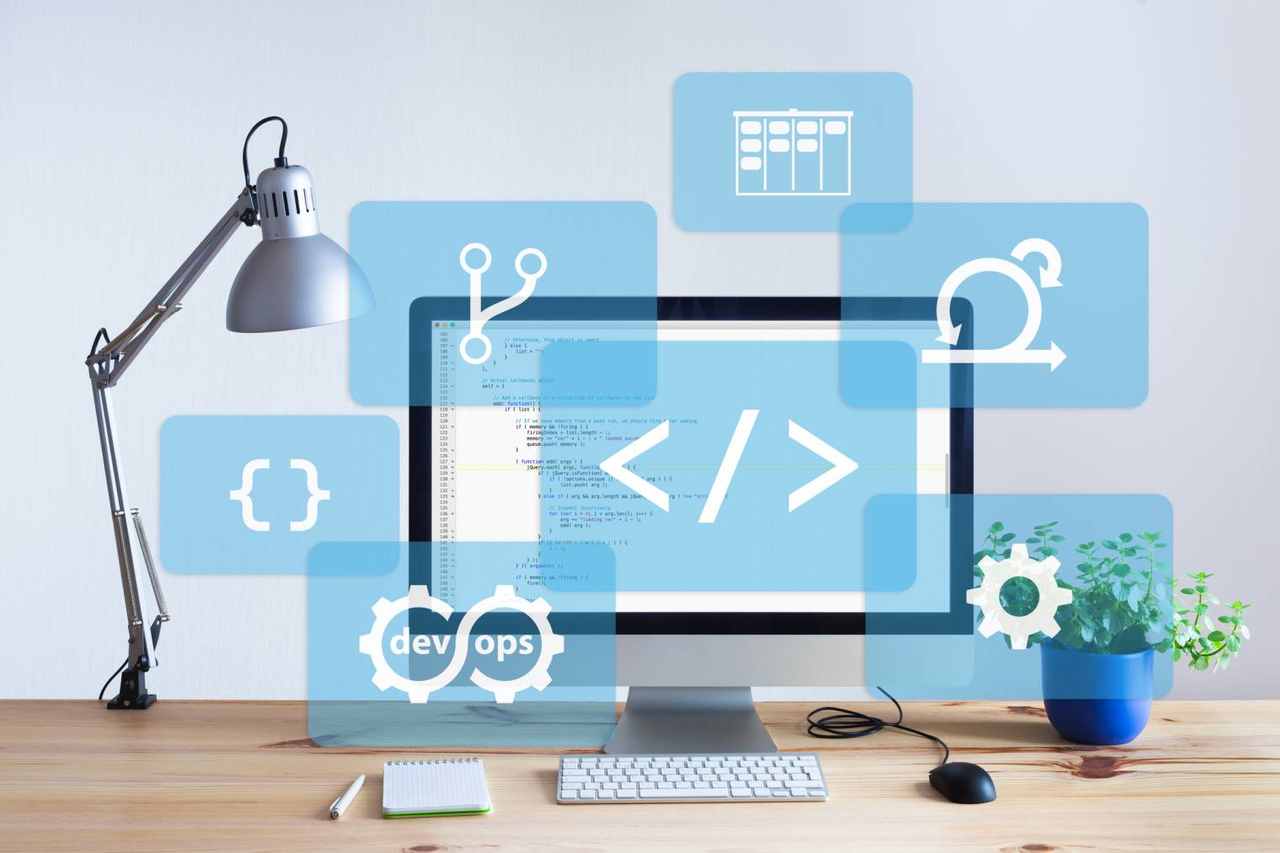Qu'est-ce que le Dev Ops ?

Sélectionnez un chapitre
Le DevOps, c'est quoi ? C'est une approche qui concile le développement et les opérations. Une méthode qui aide les entreprises à gagner en agilité et en compétitivité, raison pour laquelle nous l'enseignons dans notre formation Data Lead. Les capacités avancées du DevOps permettent avant tout d'optimiser la vitesse et la capacité des entreprises à créer de belles opportunités pour de futures innovations. Tous les détails et explications sur le DevOps dans cet article !
Pratique visant à unifier les équipes de développement et celles chargées des opérations, le DevOps permet aux entreprises de gagner en agilité et en compétitivité. L'ingénieur DevOps est aujourd'hui un acteur incontournable dans le monde de la Data. Rôles au sein de l'entreprise, compétences et formations : focus sur le DevOps dans cet article.
Le DevOps : définition et impacts sur l'entreprise
Le terme DevOps provient de la combinaison de deux mots : développement et opérations. Il s'agit d'une méthode qui a pour but de fusionner le développement (l'aspect technique) avec les opérations (la gestion de projets) et l'assurance qualité. Ainsi, dans le cadre de cette expertise, le déploiement et l'intégration sont regroupés en un seul processus continu.
Dans le monde de la Data, le DevOps désigne une gestion collaborative des données à travers l'amélioration de la communication entre les différents acteurs et l'automatisation des flux de données entre les différents acteurs. Il va ainsi mettre en relation les métiers de données comme les Data Architects, les Data Engineers, les Data Stewards ou encore les experts de la Data Warehouse, et les consommateurs de données, à savoir les Data Scientists, les Business Analysts, les dirigeants d'entreprise…
Le DevOps repose sur deux principaux concepts, le CI et le CD (l'intégration continue et le déploiement continu). Le CI ou automatisation consiste à construire et tester des codes de manière automatisée et répétitive. Il s'agit d'une méthode qui permet d'identifier les problèmes et donc de les résoudre rapidement. Le CD, quant à lui, consiste à déployer les projets et à les livrer aux acteurs qui en ont besoin. Après avoir réalisé les tests de qualification, le DevOps va permettre le passage en production des données.
Il existe un cousin du DevOps en Data : c'est le DataOps qui en est dérivé et est très couramment utilisée et adoptée en Data Science et Machine Learning.

Pourquoi réunir le développement et les opérations dans le DevOps ?
D'une part, les développeurs ont pour principal objectif de répondre aux besoins du marché avec plus d'innovation et de fonctionnalités. D'autre part, les exploitants ont besoin d'un maximum de stabilité pour garantir la qualité des services. L'idée est donc de réunir ces deux process pour les rendre plus cohérents et complémentaires. Grâce à ses compétences, l'expert va pouvoir tenir compte des contraintes et des objectifs propres à ces deux processus.
Pour faire face aux concurrents et à l'évolution des applications à un rythme effréné, l'entreprise doit repenser son process pour gagner en productivité. Et le DevOps s'inscrit dans cette vision. En effet, la méthode du DevOps va permettre de faire tomber le mur entre les équipes de développement et de gestion/production.
Les avantages du DevOps pour l'entreprise
Assez récente, cette méthode s'inscrit dans la philosophie des approches Agile et de livraison continue. Le DevOps présente plusieurs avantages pour les entreprises, d'abord en accélérant le processus de lancement des produits grâce à une livraison continue. L'entreprise va aussi pouvoir augmenter sa production. Il permet également de recevoir un feedback rapidement car les experts peuvent corriger les problèmes de manière précoce. Ce qui permettra à l'équipe de se focaliser sur la rapidité des process et la qualité des projets.
Il permet de renforcer le travail d'équipe et d'instaurer une meilleure communication au sein de l'entreprise. En d'autres termes, adopter le DevOps va rendre l'équipe plus polyvalente, efficace et productive.
Par ailleurs, le DevOps permet à l'équipe d'être réactive face aux besoins des clients. Comme la mise à jour et l'ajout de nouvelles fonctionnalités sont accélérés, l'entreprise va pouvoir répondre aux demandes de changement des clients ou des acteurs au sein de l'entreprise rapidement.
Qu'est-ce qu'un ingénieur DevOps ?
L'ingénieur DevOps est un expert dont les rôles au sein de l'entreprise sont de plus en plus reconnus. Aujourd'hui, il est très recherché par les entreprises, notamment pour superviser les différentes équipes, dont les développeurs, l'architecte d'automatisation ou encore l'équipe d'assurance qualité.
Comme son rôle se trouve à mi-chemin entre le monde du développement et l'administration, l'ingénieur DevOps va s'occuper de la gestion des processus de CI/CD et des déploiements Cloud, de la gestion de l'infrastructure et de la supervision des projets.
Cet expert doit ainsi maîtriser les différents outils et langages de programmation associés à ses rôles en tant que DevOps.

Le DevOps : quelle est sa place au sein de l'entreprise ?
Le DevOps s'est progressivement imposé au sein de l'entreprise. Cette évolution a également donné lieu à toute une série de définitions. Si ces dernières varient selon les environnements opérationnels, la place du DevOps au sein de l'entreprise peut être classée en deux catégories.
De manière générale, le DevOps sera un acteur important qui va participer à tous les processus, pour ne citer que les déploiements, l'exploitation des produits et la gestion des changements.
D'abord, le DevOps va gérer les équipes de manière plus flexible. Il va intervenir dans toute l'entreprise et favoriser la collaboration entre les différents acteurs. Il va notamment intervenir auprès de l'ensemble des process technologiques et commerciaux. C'est ainsi un acteur polyvalent et dynamique qui va interagir avec toutes les hiérarchies.
Il va également optimiser l'efficacité, la vitesse et la fiabilité des processus de production. Pour ce faire, il va combiner l'automatisation et l'utilisation des outils propres au processus DevOps.
Par ailleurs, le DevOps va s'occuper de la planification des mises à jour et de la gestion des changements. Il va jouer un rôle essentiel dans l'optimisation des processus. Il va permettre une livraison rapide et continue des projets.
Il va également intervenir dans le cadre de la gestion du changement. En effet, l'adaptation des outils et des processus de production requiert différentes décisions difficiles de la part des dirigeants. Le DevOps va ainsi coordonner les changements entre les différents acteurs. Il va favoriser le déploiement de processus sûrs et efficaces pour garantir la réussite des changements.
Quels sont les rôles du DevOps ?
Le métier de DevOps regroupe les missions inhérentes à deux métiers distincts : celui de développeur et celui d'administrateur. Le DevOps doit ainsi avoir une double compétence.
L'intervention du DevOps est devenue stratégique dans l'entreprise, car il permet d'améliorer la rapidité et les compétences des acteurs dans le cadre de l'échange, du traitement des informations et de l'optimisation des projets.
Dans le cadre de ses missions, le DevOps va créer, instaurer et gérer les systèmes informatiques. En outre, il va garantir le bon fonctionnement des solutions une fois instaurées. Il s'occupe également des mises à jour et des modifications nécessaires. Il va veiller à ce que ces systèmes soient développés en fonction des besoins de l'entreprise. Il va également s'occuper de l'optimisation de ces processus ainsi que la mise en place de l'automatisation de la production.
Ainsi, le DevOps va, entre autres, avoir pour rôles de :
- développer un projet qui répond aux besoins des destinataires,
- effectuer les tests nécessaires pour assurer la réussite de la mise en service,
- veiller au bon fonctionnement de l'application,
- accompagner l'intégration de la solution, etc.

Pourquoi parle-t-on de pipeline DevOps ?
La création d'un pipeline DevOps a pour objectif de rendre les cycles de travail plus courts, plus rapides, automatisés et répétables. Elle va ainsi apporter des changements pour que les équipes puissent répondre rapidement et efficacement aux besoins des parties prenantes ou des utilisateurs.
Les étapes du pipeline DevOps
Les étapes du pipeline DevOps forment un cycle répétable à l'infini basé sur la surveillance et l'automatisation. Il inclut :
La planification
Il s'agit d'une étape qui permet d'ajouter une nouvelle fonctionnalité ou de modifier celles existantes à partir des retours clients.
Le développement
Dans le cadre du pipeline DevOps, il faut développer les fonctionnalités afin de favoriser et faciliter le travail en équipe.
L'intégration
Les projets sont compilés pour qu'ils forment un fichier exécutable qui peut être déployé sur différents environnements et par les différents acteurs concernés.
La validation
Cette étape est réalisée dans le but de vérifier la qualité et le bon fonctionnement des projets.
La livraison
Après les différents tests, l'équipe peut livrer les projets aux destinataires.
Le déploiement
Cette étape consiste à installer le produit dans les différents environnements.
La supervision
Enfin, cette dernière étape permet de s'assurer que le produit est opérationnel.
La solution pipeline DevOps
Grâce au pipeline DevOps, il est possible de contrôler les projets et d'assurer la gestion du cycle de la donnée, de la préparation à la visualisation. Il permet également d'améliorer le côté opérationnel avec une infrastructure stable. Le monitoring dans toutes les étapes est également assuré pour garantir leurs performances.
Le pipeline DevOps permet également de travailler la communication entre les différents acteurs au sein de l'entreprise. En effet, les Data Engineers, les Data Scientists, les Data Analysts et autres acteurs sont réunis et sont amenés à collaborer ensemble.
Un dernier avantage d'une telle plateforme, c'est que vous allez avoir des métiers reliés par des pipelines déployés de façon automatisée pour passer d'un environnement à un autre facilement et rapidement.

Quelles sont les compétences du DevOps ?
L'ingénieur DevOps occupe un poste qui exige une parfaite maîtrise du développement informatique, de l'automatisation des process et du déploiement continu. Le DevOps doit ainsi :
- maîtriser l'utilisation des outils de développement (virtualisation et construction),
- avoir les compétences requises pour mettre en place des chaînes d'intégration continue CI/CD,
- maîtriser le langage de programmation utilisé et l'univers des systèmes d'exploitation,
- savoir utiliser les outils de tests automatisés et de processus ETL,
- maîtriser les outils nécessaires au monitoring des déploiements,
- avoir les compétences requises en termes de sécurité des données,
- posséder des connaissances poussées dans les systèmes de serveur, etc.
Outre les compétences techniques, l'ingénieur DevOps doit également être capable de vérifier le bon fonctionnement des solutions développées et leur performance. Il a également pour rôle de procéder aux ajustements techniques nécessaires selon l'évaluation qu'il a réalisée.
L'aspect technique n'est pas le seul domaine qu'il doit maîtriser. En effet, le DevOps doit également avoir des qualités humaines. En effet, sa capacité à interagir et à communiquer avec les autres équipes est cruciale. Outre l'esprit de management, il doit écouter et tenir compte des demandes des équipes dans ses interventions. Il faut qu'il possède des compétences relationnelles pour mieux définir les besoins et échanger avec les équipes et les différentes hiérarchies facilement.
En bref, un ingénieur DevOps doit être capable de :
- maîtriser le langage technique,
- gérer et collaborer avec les équipes,
- analyser, mettre en œuvre et veiller au bon fonctionnement du projet,
- impliquer toutes les équipes et les acteurs concernés pour développer une solution cohérente.
Les étapes pour mettre en place lors d'une approche DevOps
Pour mettre en place une approche DevOps, il faut observer quelques étapes. D'abord, il faut obtenir le soutien des dirigeants et du reste des équipes. La deuxième étape consiste à réaliser un audit pour évaluer le fonctionnement actuel. Tout cela va permettre de définir les objectifs à atteindre. Enfin, le DevOps va procéder à la mise en place des projets.
La mise en place d'une approche Devops doit également tenir compte de divers éléments, pour ne citer que :
- la configuration et la supervision des environnements,
- l'adoption d'une numérotation de version claire,
- l'utilisation d'outils d'automatisation fiables,
- la sécurisation des accès aux environnements,
- la mise en place d'une centralisation de logs…
Comment se former au DevOps ?
L'expertise DevOps est considérée comme un nouveau métier. Aussi, il n'y a pas encore beaucoup de formations. Cependant, force est de constater que les recruteurs privilégient les profils ayant eu un parcours d'ingénieur informatique (Bac +5). Or, comme la demande commence à se développer, il est possible d'accéder à un poste de DevOps junior même sans expérience.
Pour prétendre au poste d'ingénieur DevOps, il faut que le candidat ait des compétences probantes en développement et en administration de systèmes. C'est la raison pour laquelle une formation en DevOps permet d'accéder facilement au poste d'ingénieur DevOps. Cette formation est particulièrement intéressante pour un développeur logiciel ou un Data Scientist.
Articles recommandés
Data Science
Métier Data Engineer : formation, missions, salaire
Découvrez le métier de Data Engineer, un profil très technique, rare sur le marché du travail et très demandé : quel est le salaire d'un Data Engineer ? Quelles sont ses missions et les compétences requises ? Comment devenir Data Engineer ?
Blog
Qu'est-ce-que le DataOps ?
Dans la même veine que le DevOps, le DataOps est un démarche permettant d'opitmiser les processus de traitement, d'exploration et d'exploitation de la donnée. Découvrez ce que signifie cette notion de plus en plus populaire chez les entreprises.
Data Science
Métier Dev Ops : salaire, études, missions et compétences | Jedha
Dev Ops est un métier très recherché, voici son rôle, les qualités indispensables pour pratiquer ce métier, le salaire et les formations disponibles.
Data Science
Kubernetes : définition, utilités, métiers | Jedha
Kubernetes, la technologie open source très performante est un système d'exploitation du cloud permettant d'optimiser la sécurité des conteneurs. Quelle est son utilité ?




